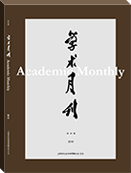Confucianism and Pragmatism: The Intrinsic Philosophical Theme and Their Diverse Developments
Abstract: How human being exists and lives is the common problem of concern in Confucianism and pragmatism. Confucianism demands bringing the way of Nature to bear upon the process of the human’s being, while pragmatism insists on turning from the transcendent world of metaphysics to the human’s process of existing. While focusing on human existence, Confucianism and pragmatism present different characteristics: while Confucianism focuses more on the reason and spirit in the being of humans, pragmatism focuses more on the empirical and sensible aspects of the process of living. Due to focusing on reason and spirit, Confucianism simultaneously seeks the elevation of human character and the perfection of life; due to focusing on sensibility and experience, pragmatism also concerns itself with effective living in connection with the survival of the biological organism. The spiritual and empirical dimensions of existence both concern the concrete situations of the individual’s being as well as the actions that unfold in situations, but Confucianism, due to being concerned with the spiritual dimension, remains committed to the original substance and knowing in the broader sense, while pragmatism, due to being rooted in experience and focusing on specific problems in situations, instrumentalizes concepts and simultaneously dissolves knowledge in practice. The perfection of life and the effectiveness of life both involve the significance of value, so Confucianism and pragmatism both focus on the evaluative dimension of knowing, but Confucianism incorporates cognition through the debate over the distinction between right and wrong, whereas pragmatism tends to eliminate cognition through evaluation



 沪公网安备 31010102003103号
沪公网安备 31010102003103号 DownLoad:
DownLoad: